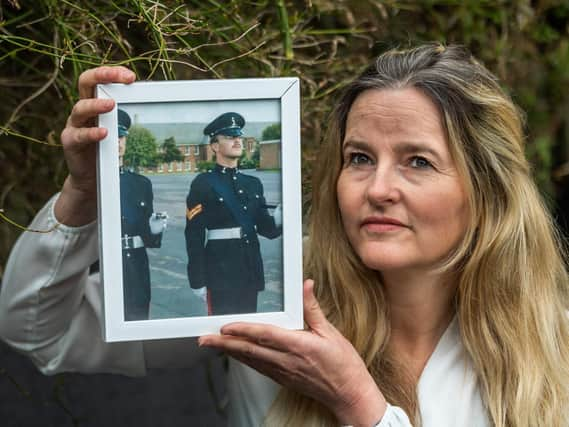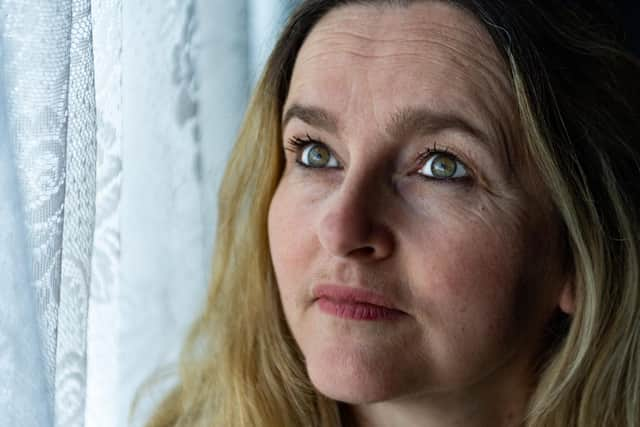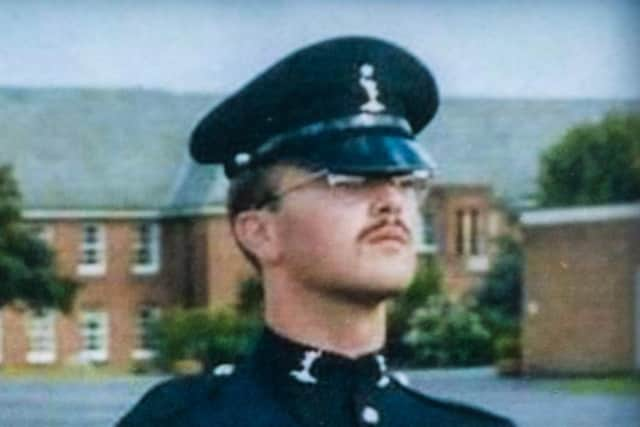'I still get really angry he is not here': Military widows share their stories for groundbreaking loneliness project


“The first time you walk in it is terrifying, you don’t know what you are walking into,” reflects Lisa Craig-Crawford of the first time she attended a meeting of the War Widows’ Association, a few months after the death of her husband Steve in 2017. “The general image people have is little old ladies weeping and talking about long-lost husbands but we are not like that at all.
“Within a very short space of time, I knew I was in the right place. It was a real sisterhood for me. People understood what you were talking about.”
Advertisement
Hide AdAdvertisement
Hide AdBut Lisa says that while she has taken great comfort from being part of WWA and also received considerable help and support from organisations like SSAFA and Veterans’ UK following Steve’s death from cancer, other bereaved partners of military personnel are not so fortunate.


“I would say it definitely falls to the charities and it falls to you to seek the charities out. Everybody’s experience is different. I never had the ‘knock on the door’ when there has been a death on military service and officers come to your home but I have friends who have. For me, I knew I would have to help myself. But when you have lost a partner, it is hard enough to get out of bed, let alone work out the best charity to help you.”
Three years later, Lisa is now a charity trustee and a public relations officer for the War Widows’ Association (WWA) and has just participated in its ongoing project with Northumbria University to better understand the challenges of social isolation and loneliness among bereaved partners of the armed forces.
The two-year project, which started last September, aims to get hundreds of widows and widowers to fill in a short survey with the intention of building a clearer national picture of their experiences of bereavement. The intention is to identify gaps in support and coming up with policy recommendations for improved services. There are almost 15,000 war widows and widowers in the UK today, with around 15 per cent represented by the WWA.
Advertisement
Hide AdAdvertisement
Hide AdThere has been little detailed research on the support they receive after bereavement but it is widely accepted that isolation following the loss of a spouse can be particularly prevalent, especially if those left behind move away from service family accommodation as they return to civilian life. The project is keen to hear from any recognised partner of personnel who died whilst in service, or of a veteran who died following their military service.


Lisa’s husband Stephen Crawford, a former staff sergeant in the Royal Signals, died on October 31, 2017 following an 11-year battle with myeloma. While he had left the military in 2002 after 24 years’ service and become a tree surgeon, the couple continued to live at Catterick Garrison in North Yorkshire where they purchased a property. She continues to live there with her daughter, while her other daughter and two grandchildren also live close by.
She says despite her good fortune with understanding friends and family, Steve’s death still remains raw.
“There is a question of which is worse – the immediate knock on the door and you get the message or having a long time to prepare? But really it is the same – you have lost your partner. I had 11 years to prepare for it but you are never quite prepared until you are actually there. The old adage that grief is the price you pay for love is one of the truest statements.
Advertisement
Hide AdAdvertisement
Hide Ad“I have got friends who got through all the stages of grief quite quickly and then just got on with their new reality. But there are others who are still stuck in certain areas. Personally, I jump between the different areas of grief. I have periods where I’m still really angry he is not here.”
Six months after his death, she decided to attend the AGM of the War Widows’ Association, which was fortuitously taking place in her home town of Bournemouth that year meaning she could stay with her parents.
“For me I was just beginning to step out of the first phase of grief. We had got through Christmas and New Year and I had got a German Shepherd puppy called Zak who was getting me out of the house every day. He was my therapy dog and he still is.”
Steve was diagnosed with Stage 3 myeloma in 2006 and told by doctors it was likely he had just two years to live.
Advertisement
Hide AdAdvertisement
Hide Ad“It was a hard time to realise something major was going on,” Lisa reflects. “He had pneumonia about four times in a row and a bad back - they were the only two symptoms throughout the previous couple of years that had occurred. To actually be told it was Stage 3 cancer was a real shock. We were told when he was diagnosed that they could control myeloma but couldn’t cure it.”
He had a radiotherapy followed by three stem cell transplants which meant he exceeded the doctor’s original prognosis by almost a decade, but it was a tough journey.
“If you imagine the pebbles on the beach with holes in them from being worn away, that is what this does,” Lisa explains of his illness. “It makes your bones very brittle. His femur broke in 2012 and it took about a year to recover from that. You end up living your life around the hospital appointments.”
She says they did their best to maintain a normal life as much as possible.
Advertisement
Hide AdAdvertisement
Hide Ad“Steve was very handy. If he didn’t know how to do something himself, he would learn and devise a way of working it out. He made a V8 engine as he had a rally car. It was his passion in life to get the rally car and engine together but unfortunately it didn’t happen. But his brother is going to finish it.
“He was affectionately known as ‘Mr Uniform’ because he would always be the best-dressed one on the parade square. He would also take the lads on outward-bounds stuff like mountaineering and cycling. He had lots of different passions.”
She says after Steve’s death both SSAFA and Veterans’ UK helped her.
“I had known about Veterans’ UK and they were absolutely fantastic. The person was incredibly helpful because Steve’s bank accounts got frozen at the time of his death. I literally had a small amount in my bank account and they got me set up with an emergency fund. I couldn’t have asked for better help from them.
Advertisement
Hide AdAdvertisement
Hide Ad“Because he was a veteran I wasn’t in the loop - had I been a service widow at the time, it would have been slightly different.”
She says being part of WWA and meeting other bereaved partners has helped highlight to her why the project with Northumbria University is important and she is among those who have already filled in a survey.
“The one thing you find is everybody’s story is different. I have got involved to show one side of the story. If you Google ‘military charities’ there are hundreds. Each one is important but at the same time it is difficult to know which is the right one for you. Even just signposting somewhere centrally where to go for the most suitable help and support could help.”
That view is shared by Mary Moreland, former chair of the WWA who helped establish the project with Northumbria University and is now a part-time research assistant on it. Mary’s husband John, a member of the Ulster Defence Regiment, was killed on his way to work by members of the IRA in 1988.
Advertisement
Hide AdAdvertisement
Hide AdShe says she hopes the study will provide for the first time a solid evidence base of how military widows are treated after the death of a partner rather than relying on individual stories.
She says while the support she received following her husband’s death was “second to none”, she knows from previous research that war widows face wildly different experiences. “I did interviews with two women who were widowed in the same event but had very different experiences. One was happy with what she had received and the other did not have a good word to say.”
Mary, who went on to work for the Civil Service and get a Masters while also raising her two sons after her husband’s death, says having the right support in the early stages can make a vast difference to the future direction of a bereaved person’s life.
“I don’t use the phrase ‘move on’, I use ‘move forward’. The initial contact is extremely important and I think that is something the survey will bring out. The difference from where you are to where you get to is that support. I have come across people who were bereaved 20 to 30 years ago and they are still probably not through the bereavement journey. People don’t always get past the anger stage and until you work your way through that it is very difficult.”
Advertisement
Hide AdAdvertisement
Hide AdPart of the study is looking at whether lockdowns have exacerbated loneliness.
Mary says the recent experience of the Queen at Prince Philip’s funeral offers an insight into what it is like to lose a partner. “There was a lot said about how lonely the Queen looked sitting on her own. Having gone through widowhood, it would have made no difference if the church had been entirely full, she still would have been lonely. It is a different kind of loneliness.”
Charity provides £100,000 for research work
Northumbria University has been awarded £100,000 by national charity the Forces in Mind Trust to conduct the research project.
Project leader Dr Gemma Wilson says: "Loneliness and social isolation are now recognised as being linked to poor physical health and well-being, such as an increased risk of high blood pressure, cognitive decline, depression, and mortality. However, despite the growing understanding of loneliness and social isolation in relation to widowhood and the Armed Forces Community, there is a lack of research specifically examining social isolation and loneliness in the Military Widowed population.
Advertisement
Hide AdAdvertisement
Hide Ad"Therefore, this project aims to explore the experiences of social isolation and loneliness, and will Inform national conversation around social isolation and loneliness of military widows and widowers, and to develop policy recommendations and guidance for service provision in the future."
Ray Lock, Chief Executive at the Forces in Mind Trust said that social isolation and loneliness can have a significant impact on a person’s health and wellbeing, and that the issue is more pressing today than ever before.
“Military life brings unique challenges,” he said. “Service personnel and their families often face multiple moves and, when they leave the Armed Forces, they can also leave behind a very close network. This can make people more vulnerable to isolation. Losing a spouse through service makes it even harder. This research is therefore both relevant and timely and will provide us with the necessary insights to produce a powerful set of recommendations that will improve the support for our war widows and widowers.”
The funding was awarded to Northumbria due to the University’s extensive experience of working to improve the health and wellbeing of veterans and their families. The University is home to The Northern Hub for Veterans and Military Families Research – a collective of academics, service providers and service users working to understand the complexities that veterans and their families experience.
Advertisement
Hide AdAdvertisement
Hide AdPhase one of the two year project involves collecting the survey responses, with the survey closing on June 30.
To complete this survey, go to this link. For a paper copy, email [email protected]
Support The Yorkshire Post and become a subscriber today. Your subscription will help us to continue to bring quality news to the people of Yorkshire. In return, you'll see fewer ads on site, get free access to our app and receive exclusive members-only offers. Click here to subscribe.